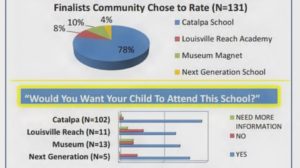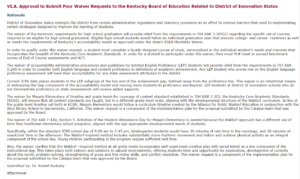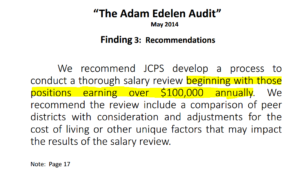(This page is a work in progress. For more information, please also visit the Maupin School of Innovation Timeline on Facebook.)

It’s a tragic story. The district is not admitting any wrongdoing, but clearly something isn’t right. And it’s the kids who suffer. Please help us raise public awareness of this situation and encourage the board to vote no to the district’s proposal to remove the Waldorf program from Maupin.
Fallacy: The school is failing because of the Waldorf model, and therefore needs to be removed.
Fact: The scores were down BEFORE Waldorf. As a result of persistently low scores, and the threat of a state intervention or takeover looming after 3 years of low performance, this is probably why they decided to place this school of innovation at Maupin. It’s a commonly used shell game in our district. If enough of the population changes, the school gets a “reset” and starts the clock over for them. When that didn’t happen, they they carried two years of failing scores INTO the brand new Waldorf model. Therefore, the school was subjected to a state intervention after just one year under its new, innovative program. Someone miscalculated what it would take to get a reset, or didn’t do the marketing and communications in order to attract enough new magnet families. The program was destined to fail.
Here is a timeline of events:
8-11-14 – After extensive research, presentations, and Q&A sessions, the Catalpa School is approved by the JCPS Board of Education as one of the winners of the District of Innovation contest.
9-22-14 – Board considers putting the Waldorf program at Maupin. State mandated testing concerns noted. Student mobility concerns noted. Parent communications will address.
9-22-14 — INITIAL WORK SESSION: This “video” merges the audio file with the powerpoints from the 9-22-14 work session.
10-13-14 — FOLLOW-UP WORK SESSION: The above work session ran out of time, so the audio for the follow-up meeting on 10-13-14 is here (the first 18 minutes are focused on Maupin).
10-13-14 – BOARD MEETING — JCPS Board of Education approved a “schoolwide implementation of the Waldorf-inspired Catalpa School concept at Maupin Elementary School for the 2015-16 school year.”
2-23-15 — WAIVER APPROVAL: Here is a snippet from the board meeting where Bob Rodosky proposes the waivers that the district will be requesting for Maupin.



Order #2015-32 – Motion Passed: Superintendent Donna Hargens recommends that the Board of Education approve four waiver requests to be submitted to the Kentucky Board of Education as part of our District of Innovation status: (1) the minimum requirements for high school graduation; (2) accountability administrative procedures and guidelines for Limited English Proficiency students; (3) Maupin Elementary—grade-level timeline deviation for coverage of Kentucky Core Academic Standards; and (4) Maupin Elementary—activities of the student attendance day. The recommendation passed with a motion by Mr. Chris Brady and a second by Mrs. Stephanie Horne.
4-24-15 – Kerrick Elementary principal to move to Maupin
Because the school is technically closing and reopening as a School of Innovation next year, Hargens had the ability to choose the principal because the new school does not yet technically have a school-based decision-making committee.
6-5-15 – Maupin may diverge from Common Core timeline
The Kentucky Department of Education has approved a waiver request from Jefferson County Public Schools that would allow Maupin Elementary to deviate from the laid-out sequence of what must be taught at each grade level under the Common Core standards.
(JCPS’ original waiver request would have allowed for even more flexibility, with all the K-8 standards needing to have been taught by the end of eighth grade, but JCPS tailored its request after speaking with state officials, who in part wanted to make sure that all elementary-level concepts were taught in elementary grades.)
11-27-15 – Maupin’s School of Innovation has rocky start
Maupin has struggled with implementing its new curriculum in this first year and also with managing student behavior that some teachers have said has significantly disrupted learning.
As students return to classes after Thanksgiving break, third-, fourth- and fifth-grade classes will move back toward a more traditional curriculum – although teachers will still “engage in Waldorf-inspired methods,” principal Maria Clemons said.
2-9-16 – Struggling school risks priority status tag
During a presentation on the district’s 19 priority schools to the school board Tuesday evening, JCPS staff warned that Maupin Elementary could fall into the dreaded state category this year because the school has not met its annual improvement goal for the past two years and currently is in the bottom 5 percent of all elementary schools statewide.
Schools are labeled in priority status if they are in the bottom 5 percent and don’t meet their goals for three consecutive years.
Maupin Elementary is the JCPS school in most danger of joining the 19 other low-performing district schools with that label, although district staff noted that other schools also could potentially enter that category after this school year, including the other School of Innovation, Atkinson Elementary.
2-29-16 – Assistant Superintendent who oversaw the implementation of Catalpa School at Maupin, Kirk Lattimore, retires
9-28-16 – JCPS test scores show little progress, achievement gap widens among student groups
Schools are placed in priority status as a result of a 2010 law that called for the Kentucky Department of Education to identify the state’s lowest-performing schools and outline a range of interventions aimed at turning them around.
However, no new priority schools were identified this year, due to the fact that the state will be switching to a new accountability model next year. Officials said it would be unfair to identify new priority schools under one accountability system and hold them accountable under a new system.
Had there been a list, district officials say Maupin Elementary School would have been on it. The number of Maupin students scoring proficient or higher in reading dropped from 17.9 percent last year to 12.8 percent this year, while math proficiency fell from 17 percent to 8.9 percent.
“Without a doubt, they would have been a priority school this year,” said Marco Munoz, the district’s director of priority schools. “Maupin is going to require a pretty strong turnaround effort. One of the first things I am going to do is get into the instructional framework and monitor how the instruction there is being implemented.”
11-19-16 – Schools of Innovation Update – audio file and powerpoint, discussion points to problem with parents who came for SOI, and also glosses over the test scores not being reset.
12-5-16 – State official encourages JCPS to ‘think bolder’ during Maupin Elementary visit
… test scores released by the state on Sept. 30 show dismal results at Maupin, placing it as among the lowest performing in the state and prompting the Kentucky Department of Education to step in.
4-6-17 — LETTER FROM PARENT: This letter from a Maupin parent was sent to Dr. Hargens.
https://dearjcps.com/dr-hargens-keep-your-promises-keep-mau…/
4-13-17 – Dear JCPS sends email to board, with some of the timeline of events, also explaining:
Parents and teachers deserve to know what the district’s plans are for this school, even if the decision is NOT to continue with the Catalpa model. Teachers have been told to put in for transfers “just to be safe.” Parents are being told nothing can be done to accommodate them if they want to transfer their children to another magnet since “no decision has been made.” We respectfully request that the JCPS BOE add this item for vote on the April 25 board meeting and allow time on the agenda for Maupin representatives to make a presentation to the board so that you can make an informed decision on how to move forward.
 4-19-17 — School sends home flyer indicating the board has already approved the discontinuation of the Waldorf program. (On right.)
4-19-17 — School sends home flyer indicating the board has already approved the discontinuation of the Waldorf program. (On right.)
“Superintendent Donna Hargens recommends the Board of Education approve the removal of magnet status from Maupin Elementary School’s Catalpa School of Innovation Magnet Program and discontinue the Catalpa Model for the 2017-18 school year.”
Only one problem. The district already made this decision over the course of the past two years, so the board is only rubber stamping their actions already in place.
NOTHING HAS CHANGED! THEY KNEW ALL OF THIS WHEN THEY APPROVED IT!! IT TAKES TIME!!!
Sadly, if they had put as much effort into supporting the school as they did preparing all of these reports, the board wouldn’t be put in this position to renege on promises made to parents, teachers, students and community members.
IS THE SCHOOL BEING SET UP FOR A CHARTER TAKEOVER?

 To Dr. Hargens and others,
To Dr. Hargens and others, Dear JCPS,
Dear JCPS, Edelen came with the observation that administrative salaries were too high, not teachers’. So I’m not sure how this discussion led to the talking point that teachers are “overpaid.” I’m guessing the committee mix above could have had something to do with it. … Again, we feel that the make-up of this committee has led to some very short-sighted conclusions, and seems to have missed the point entirely.”
Edelen came with the observation that administrative salaries were too high, not teachers’. So I’m not sure how this discussion led to the talking point that teachers are “overpaid.” I’m guessing the committee mix above could have had something to do with it. … Again, we feel that the make-up of this committee has led to some very short-sighted conclusions, and seems to have missed the point entirely.”